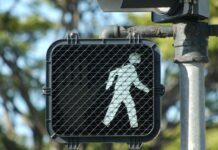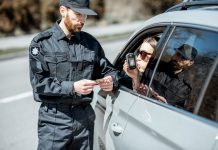A typical DWI investigation begins with a traffic stop. You may have been speeding, swerving, or you were unlucky and your license plate light was out. The best way to make certain that you are never charged with driving while intoxicated (DWI) is to take a cab or Uber, find a designated driver, or walk home. However, getting pulled over on suspicion of DUI happens to many people – even completely sober people – and the actions a driver takes in the moments that follow are critical and can impact their case going forward.
The first thing that will happen after you are pulled over is that the officer will approach your vehicle and ask for your driver’s license, registration, and/or proof of insurance. She may ask you where you are going, where you have been and, importantly, whether you have been drinking alcohol. From the start of your conversation, the officer will be looking for clues that you are intoxicated or impaired. Signs of impairment include bloodshot eyes, slurred speech, nervousness, inability to find your registration and insurance information, and the smell of intoxicants. If you are suspected of driving under the influence, he will probably ask you if you have been drinking, how much you have had to drink, and other questions to gauge your possible level of intoxication. At this point he will also ask you to get out of your car.
Everything that happens from this point on can and will be used later in court as evidence of intoxication. You will probably be asked to submit to a series of standardized field sobriety tests (SFSTs). You should assume you are being video and audio recorded through the entire testing process, and the recording can be used against you by the prosecution in your DWI case. Even if you aren’t recorded, the officer’s observations and opinions of your ability to take the test can be used in court. Field Sobriety tests are used to examine whether your mental and physical abilities are impaired by alcohol to the point that you cannot drive. Officers use many different SFSTs to test for whether a person is intoxicated, but the National Highway Transportation Safety Administration (NHTSA) has put forth three tests that “reliably” test for an elevated blood alcohol content (BAC). These are the Gaze Nystagmus (eye test), One-Leg Stand, and Walk-and-Turn Tests. It is important to understand that you DO NOT have to take these tests.
The St. Charles, Missouri Criminal Defense Attorneys at The Lampin Law Firm represent people charged with all crimes including DWI/DUI. If you have been arrested for DWI please give us a call today to discuss your case with a St. Charles, MO DWI Lawyer who can help you in court with your criminal charges.

































